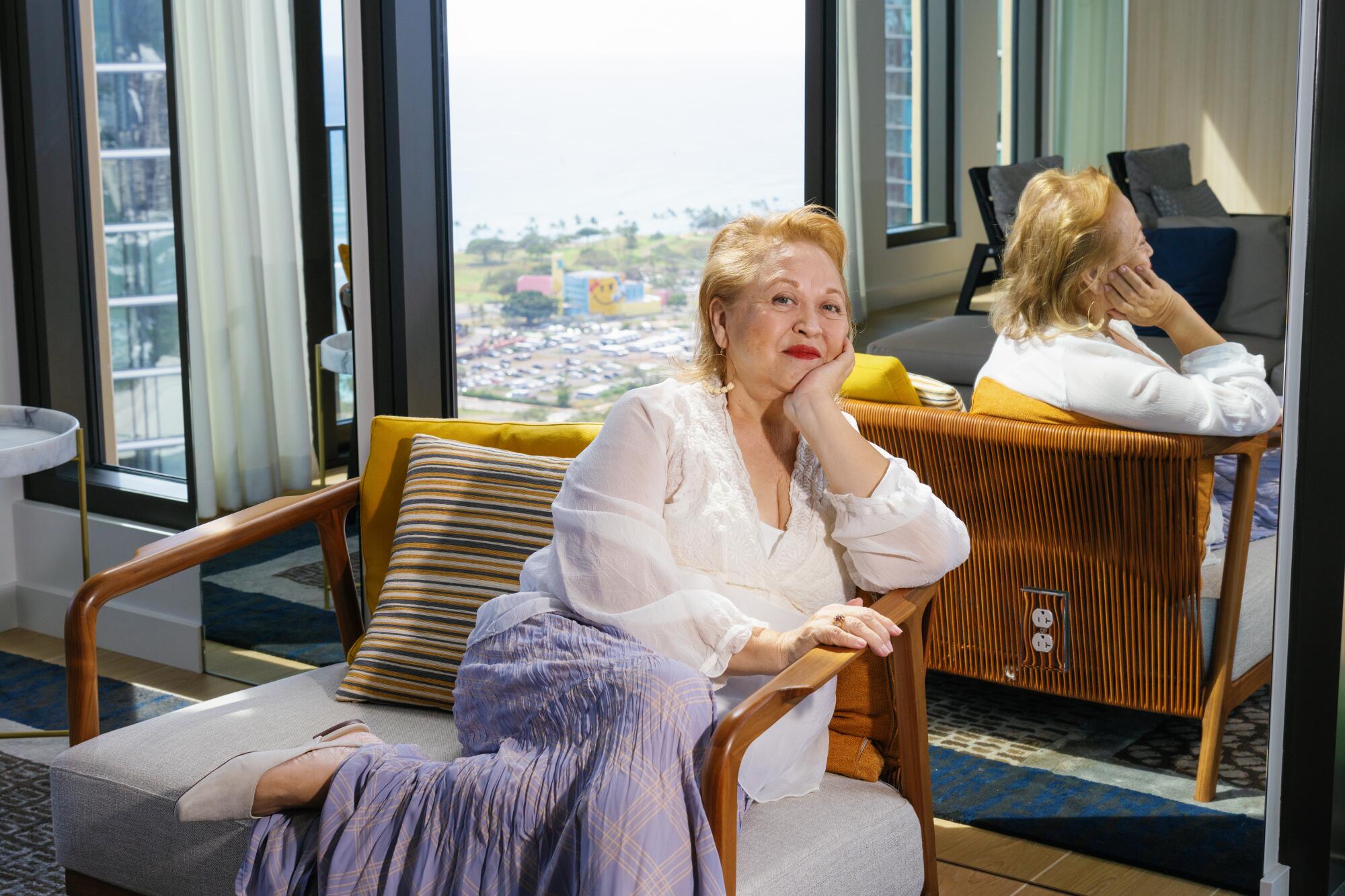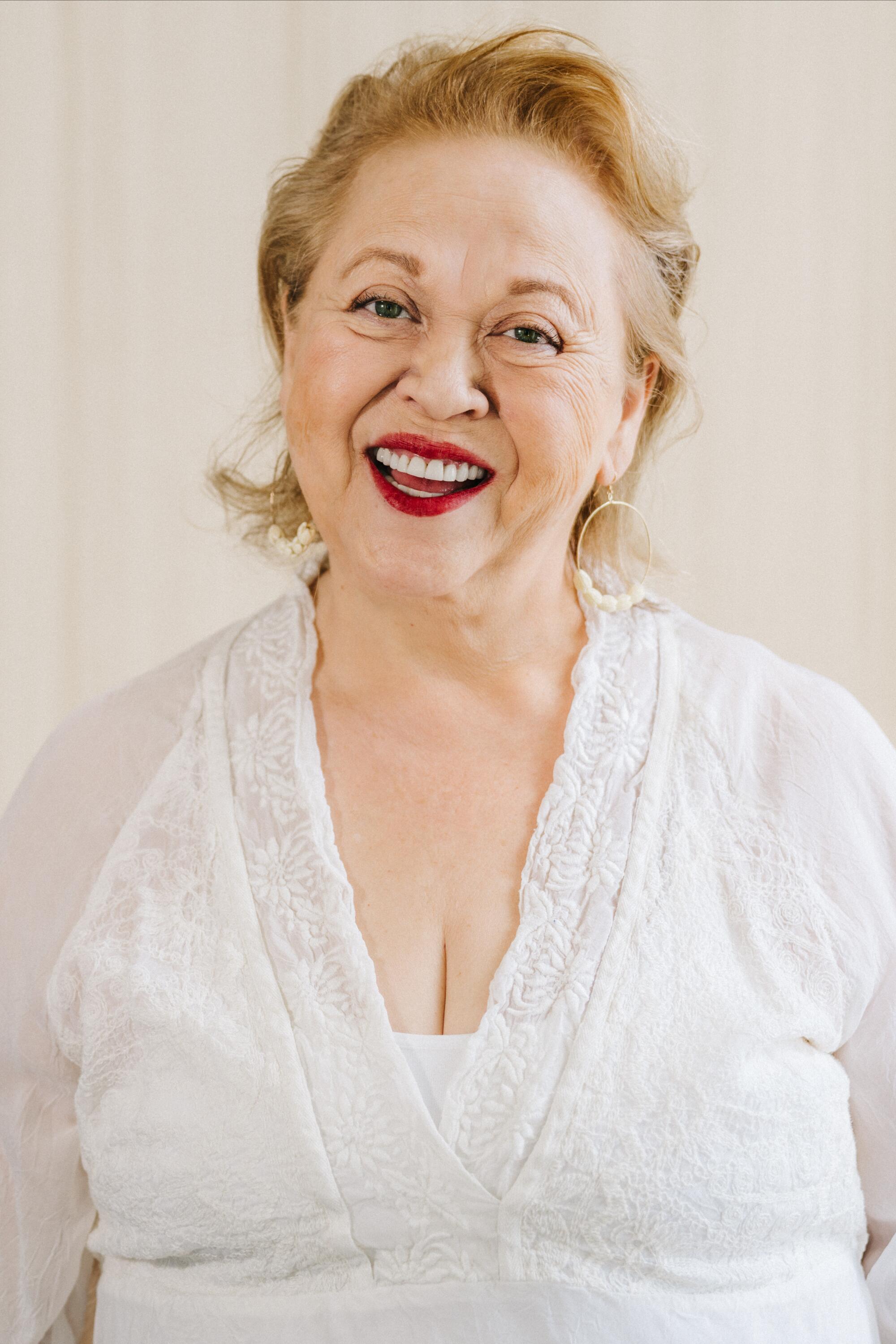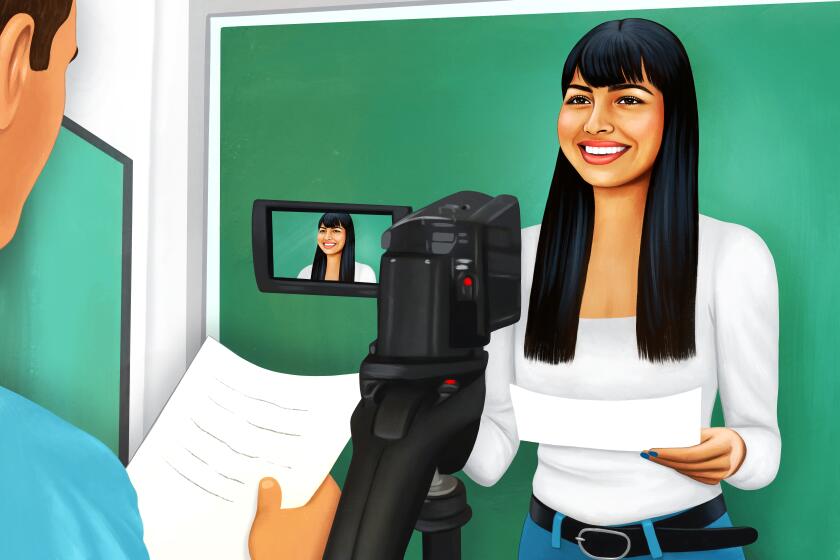
- Share via
For Amy Hill, success as an actor is about being a part of a community. She remembers making a list of career goals when she was active in the Asian American Theater Company in the ’80s — getting rich and famous wasn’t on it. She just wanted to be respected by her peers.

“What’s great for me, being on ‘Magnum” or any of the projects where I’m making a lot of money, is that it gives me the freedom to say no to jobs that are not interesting,” she said. “But also to say yes to the small community-driven films that don’t pay very much.”
Hill doesn’t think of herself as famous. But recently, it’s been hard for her to go to a Whole Foods in Hawaii without being stopped for selfies.
“Is this what it feels like to be a celebrity?” she jokes.
Many of the locals in Oahu feel like the characters she plays represent them, she said. In addition to playing Teuila “Kumu” Tuileta on the “Magnum P.I.” reboot for the last five years, Hill also gets recognized for her role as Sue, the Hukilau cafe manager in “50 First Dates.” (The Adam Sandler and Drew Barrymore romantic comedy was also shot in Oahu.)
So she tries to make appearances at community events whenever she can.

Hollywood careers
What defines success?
This profile is part of a series about what success looks like to working actors in Hollywood.
Hill has been acting for about five decades, and she has seen a lot of success — from her trilogy of one-woman autobiographical stage shows (“Tokyo Bound,” “Reunion” and “Beside Myself”) in the early ’90s to roles on film and TV projects as varied as “Seinfeld,” “Crazy Ex-Girlfriend,” “Next Friday” and “Just Add Magic.”
In Margaret Cho’s 1994 sitcom “All-American Girl,” one of the first prime-time shows to feature an Asian American family, Hill, at 41, played Cho’s 65-year-old grandmother.
Hill has been in the business long enough to not to get caught up with any accolades.
“I’ve auditioned in the past — and this happens a lot, especially for people of color — where I’m sitting next to an Oscar winner, a Tony winner, an Emmy winner, and we’re all going in to read for this small part,” she said. “So there’s always the possibility of going back to square one.”
The job of a Hollywood actor is equal parts creative and business. Professionals demystify what the job is and how to strategize for a long career.
Born in Deadwood, S.D., but raised in Seattle, Hill was the type of kid who was always making up stories and characters. She created shows for her neighbors.
But she never saw anyone who looked like her in Hollywood. Hill’s father is Finnish, and her mother is Japanese. Because she watched Japanese films growing up, she knew it was possible for her to become an actor, but she thought she lived in the wrong country.
So after high school, she moved to Tokyo for eight years.
“Their entertainment was filled with multiracial people like me, and they thought I was cool, which never happened when I was in Seattle,” she said.
She became fluent in Japanese and worked in radio and television. She hosted her own travel radio show called “Amy’s Japan.” “I was doing quite well,” she said. “And then one day, I was like, ‘Wait a minute, I wanted to do theater. I wanted to be a serious actor.’”
In the ’80s, the Asian American Theater Company in San Francisco was still fledgling. There, Hill was able to write her own stories and perform stand-up comedy and improv. At the same time, she made a really good living doing voiceover work, she said. She was the voice of Philippine Airlines for six years.
“I had a really fabulous life,” she said. “So of course I left.”
She moved to Los Angeles. It was hard to start over, but she always found her community, she said. East West Players, the Asian American theater company based in Little Tokyo, became her new home.
“I hung out with these actors I looked up to like Sab Shimono, Mako and George Takei,” she said. “It was great having these Asian American actors you revere who support you, encourage you and say, ‘You can do it.’ It’s just about staying in the game and keeping doing the work.”
She was able to pay off her credit card balances with the money she made as a Japanese interpreter on a “film in Monterey that was horrible.” She continued doing voice work for places like Lifetime Medical Television, which provided programming for doctors in the ’80s and ’90s. After her one-woman shows at East West Players started selling out and earning critical acclaim, she did university tours funded by Asian American Studies departments.
Eventually, that led to steady work in film and TV.
Nowadays, she does feel the respect from the industry — never more than when someone offers her an acting job because they’re a fan of her work.
“I don’t even care about the money; just don’t make me audition,” she said, laughing. “That’s the dream. Once I figure it out, I promise I’ll deliver.”
Photo editing and design by Calvin Alagot.
More to Read
Inside the business of entertainment
The Wide Shot brings you news, analysis and insights on everything from streaming wars to production — and what it all means for the future.
You may occasionally receive promotional content from the Los Angeles Times.











